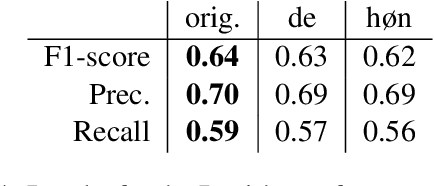How Conservative are Language Models? Adapting to the Introduction of Gender-Neutral Pronouns
Paper and Code
Apr 11, 2022



Gender-neutral pronouns have recently been introduced in many languages to a) include non-binary people and b) as a generic singular. Recent results from psycho-linguistics suggest that gender-neutral pronouns (in Swedish) are not associated with human processing difficulties. This, we show, is in sharp contrast with automated processing. We show that gender-neutral pronouns in Danish, English, and Swedish are associated with higher perplexity, more dispersed attention patterns, and worse downstream performance. We argue that such conservativity in language models may limit widespread adoption of gender-neutral pronouns and must therefore be resolved.
* To appear at NAACL 2022
 Add to Chrome
Add to Chrome Add to Firefox
Add to Firefox Add to Edge
Add to Edge